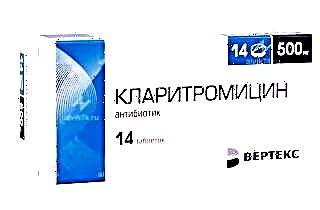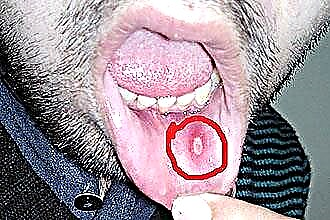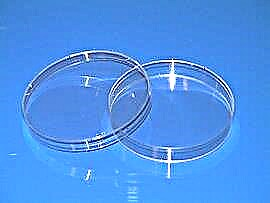Follicular tonsillitis affects the tonsils. With the naked eye, you can see that they are greatly enlarged and swollen. Purulent follicles are usually white or off-yellow in color. The pustules are small - only 1-2 mm. When they break through, a whitish coating forms on the tonsils - one of the main signs of follicular sore throat.
Antibiotics for follicular angina are prescribed when a plaque is found on the tonsils, the cervical lymph nodes are painful, and a high temperature persists. If all of these 3 symptoms are present at the same time, antibacterial drugs will be prescribed without examination. When there are only 1 or 2 signs, antibiotic treatment of follicular sore throat will be prescribed only with a positive result of bacteriological analysis.
How is the selection of the drug
 Follicular tonsillitis is treated with the same antibacterial agents that are usually used for other forms of tonsillitis. First of all, the doctor chooses a drug from the penicillin group. And only if the penicillins do not fit, you can proceed to the selection of antibiotics from the following categories:
Follicular tonsillitis is treated with the same antibacterial agents that are usually used for other forms of tonsillitis. First of all, the doctor chooses a drug from the penicillin group. And only if the penicillins do not fit, you can proceed to the selection of antibiotics from the following categories:
- Cephalosporins. They are almost complete analogues of penicillins in terms of safety and degree of effectiveness. Angina can be treated with Cefadroxil, Apo-Cephalex, Azaran, Suprax, Duracef and the like.
- Macrolides. Antibacterial substances such as erythromycin, spiromycin, josamycin, azithromycin and others cope best with follicular sore throat. This category is represented by Hemomycin, Azitro-Sandoz and Sumamed.
- Lincosamides (drugs with the active ingredients lincomycin and clindamycin) are rarely prescribed. The reason for this caution is that they cause serious side effects. Therefore, it is advisable to use them only when any other drug cannot be used.
Before a doctor prescribes antibiotic treatment and chooses the most effective one, he should find out:
- what type of bacteria provoked sore throat;
- what antibacterial agents the patient has already taken, and whether he was allergic to them;
- how many cases of angina in the patient's history.
The type of the causative agent of tonsillitis by eye, of course, cannot be determined. It will take at least 3-4 days to get this information. This is exactly how much is needed to prepare the analysis results. But during this time, tonsillitis can be successfully overcome with antibiotics with a wide range of effects.
Therefore, when choosing an antibacterial drug for the treatment of follicular sore throat, the doctor prescribes one of the most effective drugs that will equally suppress both staphylococcus and streptococcus.
Choosing and taking an antibiotic yourself, without consulting a specialist and taking into account individual sensitivity, can be dangerous to health.
The use of penicillins
 For follicular angina, among all known antibiotics, penicillins are the first to be chosen. They are distinguished by the highest safety (many of them are allowed to be taken by pregnant and lactating women - but only under medical supervision). In addition, they are characterized by excellent indicators of pharmacokinetics (rapid absorption in the stomach and weak digestion by enzymes). They rarely provoke side effects on the part of the digestive system. The use of penicillins during pregnancy and breastfeeding is accompanied by a minimal risk of exposure to the fetus or newborn.
For follicular angina, among all known antibiotics, penicillins are the first to be chosen. They are distinguished by the highest safety (many of them are allowed to be taken by pregnant and lactating women - but only under medical supervision). In addition, they are characterized by excellent indicators of pharmacokinetics (rapid absorption in the stomach and weak digestion by enzymes). They rarely provoke side effects on the part of the digestive system. The use of penicillins during pregnancy and breastfeeding is accompanied by a minimal risk of exposure to the fetus or newborn.
Follicular angina is often treated with amoxicillin. Today it is the best antibiotic in all respects. The cost of drugs made on the basis of this active substance is relatively low. Let's list them: "Flemoxin Solutab", "Ospamox", "Apo-Amoxic", "Amoxisar", "Amoxicar", "Amosin".
Among other drugs of the penicillin group, they have proven themselves well:
- Ampicillin - in pharmacokinetics, it significantly lags behind amoxicillin. Usually used in the form of injections, since when taken orally, most of the active substance is degraded in the stomach. Among ampicillin preparations it is worth noting Uppsampi, Apo-Ampi and Ampik.
- Phenoxymethylpenicillin - found in products such as Ospin, Cleatsil and Vepikombin.
The disadvantage of penicillin antibiotics is the increased resistance to them in most of the pathogens of tonsillitis. Many staphylococci and streptococci have developed the enzyme penicillinase and do not respond to antibiotic therapy. In such cases, we can talk about the ineffectiveness of penicillins.
The inability of penicillins to cope with certain types of pathogens of follicular sore throat gave rise to the creation of new antibiotics - complexes of inhibitor-protected penicillins. Today they are used very actively.
 Such complexes are presented:
Such complexes are presented:
- ampicillin and sulbactam (sultamicillin) - are the basis of "Ampisid", "Sultasin";
- amoxicillin and clavulanic acid (contained in "Augmentin", "Amoxiclav", "Flemoklav-Solutab").
Newer drugs are more effective. After all, sulbactam and clavulanic acid deprive resistant bacteria of their defense against penicillins.
Today, "Amoxiclav" and "Augmentin" are the main drugs that can be used to treat follicular sore throat on an outpatient basis, that is, at home. They compare favorably with a variety of release forms (tablets, powder for injection and suspension powder). Both drugs are allowed for both adults and children literally from the first days of life.
Treatment with cephalosporins
It is advisable to use cephalosporin antibiotics for follicular angina if:
- harmful bacteria were found to be resistant to penicillin drugs, but not resistant to β-lactams;
- the patient is allergic to penicillin.
Ceftriaxone is an injectable antibiotic. This medicine belongs to the third generation of antibacterial drugs. It is considered one of the most effective. However, it is prescribed infrequently - only in case of neglect of the disease. Doctors recommend treating with pills first. If it didn't help, then you can connect Ceftriaxone as a last resort.
"Cefodox" - this remedy is allowed to be taken by both adults and children. True, if the child has not yet reached the age of 12, it is better not to give him the drug in the form of tablets. For such children, a suspension form is provided - the powder must simply be dissolved in water.
 Cefodox has several side effects - nausea, headache and itching. If the latter occurs, you need to stop taking this remedy. Indeed, in this way, an allergy to it can manifest itself.
Cefodox has several side effects - nausea, headache and itching. If the latter occurs, you need to stop taking this remedy. Indeed, in this way, an allergy to it can manifest itself.
Cefuroxime is a second generation antibiotic. Its main disadvantage is that the active ingredients are absorbed in the stomach by 60%. This means that you don't have to expect a quick effect. Therefore, doctors rarely prescribe this remedy to adult patients. The course of treatment with this drug is 10 days.
In the past few years, new cephalosporins and, accordingly, drugs based on them have entered the pharmaceutical market:
- cefixime ("Suprax");
- cephalexin ("Ecocephron");
- cefoxitin ("Mefoxin").
Separately, it should be said about the drug "Suprax". Its high efficiency in the treatment of angina is proved by numerous cases of successful recovery.By the way, very often this medicine effectively fights against pathogens that have become resistant to antibacterial agents of the penicillin group.
But if the follicular sore throat was provoked by a staphylococcal infection, "Suprax" will not help. This must be taken into account.
Macrolide therapy
If a patient has an allergic reaction to antibacterial drugs of the penicillin category, and cephalosporin drugs for some reason do not work, the doctor prescribes macrolides. These medicines help to cope with follicular sore throat in just 3 days - a maximum of 5 days. The high speed of the onset of recovery is one of the advantages of macrolide antibiotics. However, trained physicians frown upon accelerated treatment regimens.
 Clarithromycin is the most popular in adults for follicular angina. The course of treatment usually takes at least a week. This antibiotic can also be used to treat children. Only the dosage will need to be calculated taking into account the weight of the child.
Clarithromycin is the most popular in adults for follicular angina. The course of treatment usually takes at least a week. This antibiotic can also be used to treat children. Only the dosage will need to be calculated taking into account the weight of the child.- "Azithromycin" is an effective antibacterial agent. One package contains only 3 tablets. In many cases, more will not be needed. After all, the duration of the course of treatment with this medication is 3 days. The dosage directly depends on the person's body weight. Sometimes it so happens that one package is not enough. Then the doctor extends the course of treatment up to 6 days.
- Medicines "Azitro Sandoz" and "Sumamed" are allowed even for children from one year of age. They are produced in suspension powder form. Convenient form allows widespread use of these antibiotics for the treatment of children.
It should be noted that macrolides have one drawback. They more often than other antibacterial drugs provoke the occurrence of side effects from the digestive system. Moreover, in certain cases, the side effect may be more severe than follicular tonsillitis.
How to treat follicular sore throat "Flemoxin"
Antibacterial drug "Flemoxin" effectively eliminates the inflammatory process that develops in follicular tonsillitis, and straightens out a bacterial infection. Often this medicine is used without permission, without prior consultation with a specialist. We note right away that, despite its safety, this cannot be done. Any antibiotic should be taken under the supervision of a doctor.
"Flemoxin" is allowed to be used for the treatment of tonsillitis not only for adults, but also for children - and regardless of their age. In addition, this remedy can even be used by pregnant women.
Flemoxin is an antibacterial drug with a wide range of effects. It successfully fights harmful microorganisms, eliminating gram-negative and gram-positive bacteria equally well. The active ingredients of the drug reach their maximum concentration in the blood within a couple of hours after ingestion. The product is highly resistant to stomach acid. The kidneys remove it from the body to the outside approximately 8-10 hours after consumption. And in babies who have not reached the age of one year, this process occurs 2 times faster.
 "Flemoxin" is produced in the form of tablets and suspension powder. This drug should be taken strictly according to the rules established by the manufacturer - one hour before or a couple of hours after a meal. When follicular tonsillitis is easy or not very difficult, the duration of the course of treatment will be about 7 days. If the disease is difficult enough, you will have to take the medicine for 10 or even 14 days. In no case should the course of treatment be interrupted.
"Flemoxin" is produced in the form of tablets and suspension powder. This drug should be taken strictly according to the rules established by the manufacturer - one hour before or a couple of hours after a meal. When follicular tonsillitis is easy or not very difficult, the duration of the course of treatment will be about 7 days. If the disease is difficult enough, you will have to take the medicine for 10 or even 14 days. In no case should the course of treatment be interrupted.
If after 3-4 days there is a significant improvement in the condition, the pills must still be drunk to the end. After all, it is very difficult to completely eliminate a bacterial infection in the body, so you need to take enough time for this.
It is forbidden to use "Flemoxin" if a person has a high individual sensitivity to its contents. Also, this medication is contraindicated if the patient suffers from impaired functioning of the liver, kidneys and infections, accompanied by inflammation of the lymph nodes.
What can be used for pregnant and lactating women
Follicular tonsillitis is a huge danger for a woman expecting a baby. We emphasize that only a doctor can prescribe an antibacterial drug during pregnancy. It is strictly forbidden to independently choose and accept them. After all, many antibiotics have a toxic effect on the fetus, and the pregnant woman may not even know about it. And yet, if a woman in a position was diagnosed with follicular sore throat, she will not be able to do without such drugs. Today, there are drugs that are considered relatively safe for pregnant women. Their active substances do not penetrate the placenta and thus are not capable of harming the fetus. The duration of treatment with such medications is usually as short as possible.
Pregnant women with follicular angina can take the following medications:
 from penicillins: "Amoxiclav" and "Amoxicillin";
from penicillins: "Amoxiclav" and "Amoxicillin";- from cephalosporins: "Cefelim" and "Cefazolin".
Antibiotics-macrolides - "Roxithromycin", "Clarithromycin" and "Midecamycin" are strictly prohibited due to the high risk to the fetus.
A woman who is feeding a child with breast milk, with a diagnosed follicular sore throat, must definitely take antibacterial drugs. Unfortunately, so far there are no antibiotics that would not penetrate into breast milk at all. However, there are medications that pass into breast milk in microscopic amounts. These include some penicillins, cephalosporins, and macrolides.
During lactation, it is permissible to be treated with such means (except for those that are allowed during pregnancy): "Benzylpenicillin", "Ampicillin", "Cephalexin", "Sumamed", "Azithromycin".
Antibiotic rules
Antibiotic treatment of follicular sore throat will be successful only if they are taken correctly. It is very important not only to know the names of the best antibacterial drugs that can be treated, but also to understand how to calculate the dosage and at what interval to take them. There are several recommendations, following which you can increase the effect of antibiotic therapy.
- The first thing to do after purchasing an antibiotic at a pharmacy is to carefully read the attached instructions. Particular attention should be paid to dosage and contraindications. In some cases, the dosage is determined by the doctor on an individual basis. For the treatment to be successful, the doctor's recommendation must be followed. Unauthorized experiments with doses are strictly prohibited.
 If after 2 days of taking the antibacterial agent there is no improvement in the condition, this means that this drug does not fight harmful bacteria. Then it is necessary to do a bacteriological analysis. To do this, the doctor will take a regular swab from the affected tonsils. Given the results obtained, the doctor must replace the medication with a more effective one.
If after 2 days of taking the antibacterial agent there is no improvement in the condition, this means that this drug does not fight harmful bacteria. Then it is necessary to do a bacteriological analysis. To do this, the doctor will take a regular swab from the affected tonsils. Given the results obtained, the doctor must replace the medication with a more effective one.- It is necessary to drink tablets, capsules or suspension at regular intervals. If you are afraid that you will forget, it is advisable to leave reminders. Timely intake of an antibacterial agent is the key to a quick recovery.
- The course of antibiotic therapy can last an average of 3-10 days. Already during the consultation, the doctor will notify you of the recommended duration of treatment.
- Antibiotics adversely affect the functioning of the digestive tract.To prevent the appearance of indigestion and subsequent problems with stool, you need to drink bifidobacteria in parallel with the antibacterial agent.
- In some cases, your doctor may prescribe an antifungal agent. The fact is that antibiotics destroy not only harmful, but also beneficial symbiont bacteria that live on mucous membranes. As soon as the beneficial bacteria disappear, fungi can settle in their place. These are well-known provocateurs of a harmless, but very unpleasant disease - candidiasis (popularly - "thrush").
- During the period of antibiotic therapy, it is forbidden to consume fatty foods and alcohol in any volume. They reduce the effect of medications.
If you adhere to all of the above rules, then follicular sore throat can be eliminated quickly enough and without consequences.
And finally
Antibacterial medicines are the main method of treating follicular sore throat. Today there is a fairly wide range of various drugs that effectively fight bacteria. Therefore, as a rule, there are no problems with the selection of a suitable medicine.
Follicular tonsillitis is successfully treated with simple, affordable and safe means - penicillins, cephalosporins, macrolides of different generations. They can also cure lacunar or catarrhal sore throat.
An antibacterial drug should be prescribed exclusively by a doctor, taking into account the resistance of bacteria, the presence or absence of allergic reactions, individual sensitivity, and anamnesis data.

 Clarithromycin is the most popular in adults for follicular angina. The course of treatment usually takes at least a week. This antibiotic can also be used to treat children. Only the dosage will need to be calculated taking into account the weight of the child.
Clarithromycin is the most popular in adults for follicular angina. The course of treatment usually takes at least a week. This antibiotic can also be used to treat children. Only the dosage will need to be calculated taking into account the weight of the child. from penicillins: "Amoxiclav" and "Amoxicillin";
from penicillins: "Amoxiclav" and "Amoxicillin"; If after 2 days of taking the antibacterial agent there is no improvement in the condition, this means that this drug does not fight harmful bacteria. Then it is necessary to do a bacteriological analysis. To do this, the doctor will take a regular swab from the affected tonsils. Given the results obtained, the doctor must replace the medication with a more effective one.
If after 2 days of taking the antibacterial agent there is no improvement in the condition, this means that this drug does not fight harmful bacteria. Then it is necessary to do a bacteriological analysis. To do this, the doctor will take a regular swab from the affected tonsils. Given the results obtained, the doctor must replace the medication with a more effective one.

